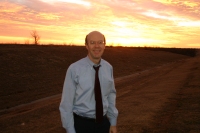

 |

|
|
|
|
Commission plans to examine ratesby Adam WilmothThe Daily Oklahoman - January 4, 2004Alternative energy and alternative regulation dominated much of the Oklahoma Corporation Commission's time in 2003, but the new year's docket is expected to focus more on increasing security costs and natural gas prices. The largest issue the commission dealt with in 2003 may have been the 300-foot-tall windmills that were installed north of Woodward and north of Lawton. Three of the state's largest electric utilities built wind farms with a total capacity of 175 megawatts of electricity, enough to power about 175,000 homes. Oklahoma Municipal Power Authority and Western Farmers Electric Cooperative are not regulated by the commission, but the commissioners did have a say in Oklahoma Gas and Electric Co.'s plan to pay for its wind farm by charging a "green fee" to customers who volunteer to support the program. "Wind energy gives diversity to our portfolio of energy sources, but it also gives individual consumers the opportunity to participate in a green power source if they choose to," Commissioner Bob Anthony said last week. Early in 2003, the commission approved two measures that benefited schools and small businesses. The first plan allowed Oklahoma Natural Gas Co. to distribute money to schools as part of a $1.5 million settlement refund. The 253 public school districts that ONG services were expected to save 35 percent to 40 percent on their gas bills in February. ONG estimated that the plan saved Tulsa Public Schools about $200,000 and the Oklahoma City Public Schools about $145,000. Just two weeks later, the commission approved a plan that allowed schools and certain small businesses serviced by ONG to buy their gas from a third-party provider. The gas would still be delivered by ONG, but the schools and businesses would no longer be required to buy their gas at the rate paid by ONG. In a more controversial move, the commission also acted in 2003 to allow SBC to replace its LocalPlus calling plan with a series of alternative offerings. Critics say the change makes it too costly for some rural Oklahomans to have Internet access because there are no services available on local phone numbers. SBC argued, however, that the changes give its customers more options than the one-size-fits-all LocalPlus plan. The commission approved a six-month test period for SBC's plan. When the six months are up, the plan will have to be reviewed. "The jury's still out," Anthony said. Increased competition was another significant change in 2003 that affected both consumers and SBC. That change began with a 1996 federal law and a 2002 commission action that encouraged increased competition among telephone providers in the state, but only became more realized in 2003, Anthony said. Before the change, telephone service was distributed and regulated in much the same way as electric service. One company was given a complete monopoly, and the commission set the rates that could be charged. Because of the 1996 and 2002 changes, however, other telephone companies may now lease the former monopoly company's system and sell the service to customers. Dozens of smaller companies have entered the market in recent years, but Cox Communications announced in 2003 that it will expand its telephone service in Oklahoma, and AT&T began in November offering service throughout much of Oklahoma. "To have extra competition means you have companies who are engaged in price competition and have innovative service offerings," Anthony said. While 2003 was marked by increased competition and rebates, the new year is already panning out to be a year of proposed rate increases. Three of the state's largest utilities, OG&E, ONG and Public Service Co. of Oklahoma, have asked for increases to their rates beginning in 2004. ONG announced an agreement Friday with the attorney general's office and the commission staff for its proposed rate increase that would cost the average consumer an extra $1.40 a month. The commissioners are expected to hear the issue this week. The two electric companies' proposals are scheduled for hearings this spring. Rate hike requests are not unusual, but one unique aspect about this round of proposals is an allotment for homeland security costs. The issue also poses freedom of information and open records questions. "Most of what the utilities do should be subject to inspection of the public, but if the utilities have a security plan for a perimeter fence or for restoring power after an attack, the commission will have to review those plans under a secure or classified approach," Anthony said. The other big issue that's likely to be discussed throughout much of this year is the price of natural gas, which is hovering at about twice as high as historical averages. The high prices have led to improved revenues and encouraged increased drilling throughout the state. © 2004 The Daily Oklahoman
|
|
 |
Honesty. Integrity. ANTHONY.Last updated:
March 07, 2019. |
|